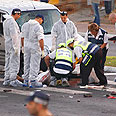
Islamic Jihad struck in Netanya
Photo: Yaron Brenner
Security authorities are closely familiar with the cell that carried out Tuesday's terror attack in Netanya and apparently also detonated the car bomb in the West Bank about an hour earlier.
The cell has been in the sights of the security establishment for five months at least, since the bombing at the Stage nightclub in Tel Aviv.
Suicide Attack
By Raanan Ben-Zur and Avi Cohen
Names of three female victims have not been cleared for publication; 41 still hospitalized
Authorities have followed the cell's maturation process, they know who heads it, and realize it is planning to carry out more suicide attacks.
Cell members were caught in possession of explosive belts in Beit Hanina, and among other attacks carried out the shooting in Baqa al-Sharqia. During normal days, this infrastructure would have been pulverized at its nascent stage, when it was still building up its capabilities.
However, for long months Israel has imposed limitations on itself as a result of the relative lull in violence.
Only several weeks ago did Israel stop the process of "watching" the terror infrastructure mature and went back to an all-out, active war against the renewing Islamic Jihad infrastructure.
Still, too much time had been wasted.
Very unstable lull
If you fail to hit a cell while it is still preparing the explosives or recruiting members, you will pay for it with a short advance notice, if at all, before a terror attack.
It is true, thwarting all attacks is impossible. Yet the chances improve when authorities have a longer advance notice.
The immediate price paid by Israel for a shorter advanced notice is a terror wave that peaked Tuesday with two suicide bombings, one at the heart of Israel and the other in the West Bank, 50 minutes apart.
Overall, we have been living through a very unstable lull. On the Palestinian side, this model is filled with internal contradictions.
The Palestinians have shown public commitment to restraining terrorists but complete impotence in the war against rebellious groups.
Four days ago, Palestinian leader Mahmoud Abbas surrendered. He invited himself to Damascus to meet with leaders of rejectionist organizations, headed by the Islamic Jihad.
The Syrians held a luncheon in his honor and in order to mock him invited Abu-Musa, who heads Fatah rebel group.
Abbas asked terror leaders and the Syrians to curb military activity and assist him in maintaining the calm. Tuesday's terror attacks are the answer: They simply spat in his face.
Abbas given the finger
Indeed, most terror attacks perpetrated these days, in the West Bank or Gaza, are carried out by the Islamic Jihad. The organization took a strategic decision to undermine the disengagement process and is attempting to drag the Hamas into the mix, in a bid to go back to an armed conflict with Israel.
According to Israeli intelligence sources, the Islamic Jihad is at the point where it is carrying out a series of attacks prepared in advance in a bid to produce "strategic strikes" that would thwart any agreement.
Meanwhile, Abbas, who was virtually given the finger, was scared to single out the Jihad as the group behind the latest bombing.
Following the Tel Aviv attack at the Stage nightclub, Abbas also chose to single out an abstract third party. The man is continuously weakening.
On the Israeli side, the implication of the fragile lull is the willingness to assume risks in order to allow for a move that would culminate in a pullout that is not carried out under fire.
The operative implication of those risks is the removal of roadblocks, a decrease in the scope of arrests, and various concessions.
On Tuesday, Defense Minister Shaul Mofaz demanded to be presented with a comprehensive plan to uproot the Islamic Jihad infrastructure in the West bank. The handover of more Palestinian towns to the PA has been slowed down, and at this time there will be no meetings with Palestinian officials to coordinate the pullout, while a closure is imposed on the territories.
Is the risk-taking era over then? Who would enjoy the delay in coordinating the disengagement? And what is the connection between an all-out war on Islamic Jihad members and the easing of Palestinian daily life?
Imposing a closure on the territories may not cool off the Islamic Jihad's motivation, but the closure may very well thwart Yesha Council plans to organize mass settler protest marches from the West Bank to Gaza.















